| Photojournal
- 27
November 2004
The
Squamish inquisition
|
Saturday the 27th of
November was one of the rarest of days. This was because it was
a day I had been planning for a couple of weeks. Typically, if
I plan my time about an hour in advance, I'm doing well. Not only
was my day planned, but it also involved getting up early. Maybe
now you're realizing just how rare this day was.
On this day, I mounted
an expedition to Squamish (a mountain town about an hour's drive
north of Vancouver) with fellow birders and friends Ilya and Jeff.
We were going to visit Grant and Marcia, a pair of birders from
Squamish whom I had met on the end of the Iona ferry jetty. Grant
and Marcia had invited us up to join them in birding for a day.
Our list of target
birds included a Western Scrub-Jay that had been visiting Grant
and Marcia's every morning around 8:30. We were also hoping to
get some good looks at American Dippers, which Grant and Marcia
had said were out and singing a few weeks previous. Also on our
wish-lists, but pretty improbable, was the Ruffed Grouse.
We got there right
on time at 8:30. It was chilly out, and the road and the driveway
were covered with a thin layer of ice. It was pretty slippery,
so we trod carefully on our way to the door. A number of Steller's
Jays were hanging around in the trees watching us, probably noticing
our slow and awkward passage.
We were welcomed in,
and to our surprise, not only Grant and Marcia were there, but
there was another fellow, Bill, as well. Bill looked familiar,
but I couldn't quite place him. Later I figured out that I had
briefly spoken with him the week before at Reifel. After a flurry
of good-mornings and well-mets, Marcia told us that we might be
in for an extra treat--yesterday in scouting the area she had
found a Northern Pygmy-Owl, and there was a decent chance that
we would be able to relocate it.
We settled near the
sliding glass door that leads to the deck and the backyard. There
we could see a backyard that looked close to ideal for birding...several
different trees of different sorts, some brushy stuff, a small
pool, and a few feeders. All that and Marcia at the door with
four or five containers of peanuts and different seeds. Speaking
of which, Marcia then proceeded out into the cold and started
spreading the peanuts through the yard.
This caused Jay pandemonium.
Steller's-Jay pandemonium, that is. About twenty of the blue beasts
came flying in from all directions to gather the strewn nuts.
I couldn't stand being behind an extra piece of glass, so I got
my shoes from the front door and headed on out to the deck. There
was plenty of light for birding, but a bit too little for good
photography. I set my camera on ISO 1000 and took lots of shots,
hoping that the occasional shot would turn out sharp. This worked
as hoped and out of about 35 shots of the jays I got one or two
usable ones. Here's the clearest of the bunch.
|
|
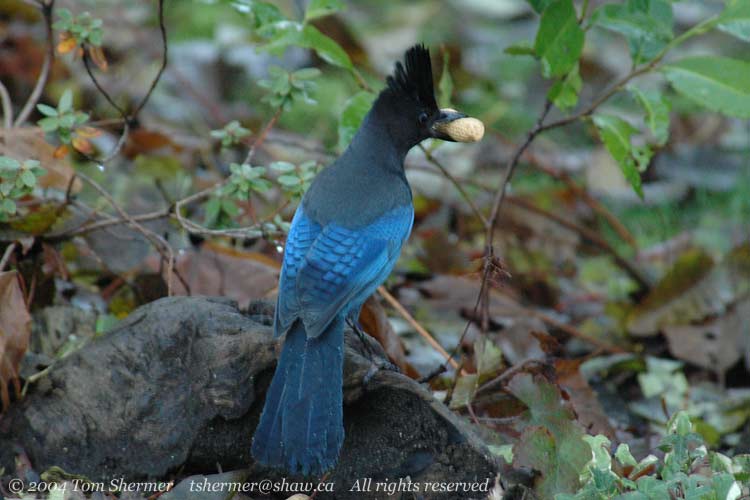 |
|
I know they're fairly
common, and sometimes a downright nuisance, but I love Steller's
Jays. Their shape and their color just somehow hit my aesthetic
sense in the right way. This was my first chance to photograph
such a mob of them, and I was pretty happy.
Not everyone was as
content as I, though. The hope was that the Western Scrub-Jay
would show up. We watched and saw a bunch of squirrels joining
in the peanut feast, a Pine Siskin at a feeder, and a Varied Thrush
hopping around behind the little pond. A Cooper's Hawk even came
by and perched in the top of a tree in the backyard. Again, the
light wasn't too great and so I ended up with a fairly noisy photo.
|
|
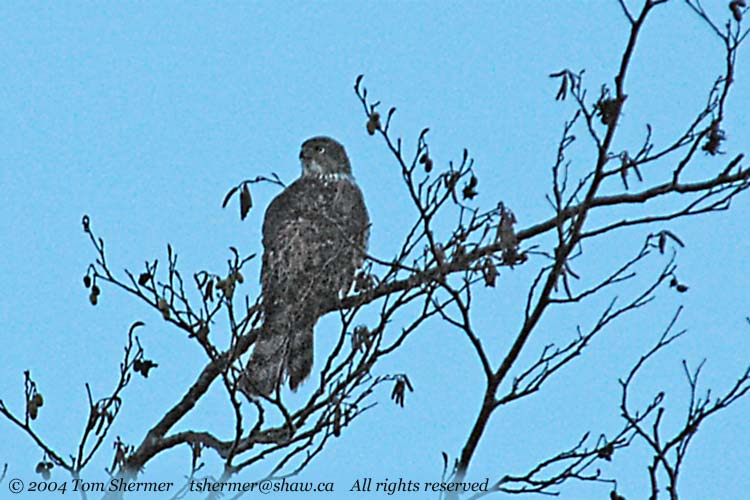 |
|
In the end, despite
several rounds of peanuts thrown out, the scrub-jay didn't show
itself. We decided to walk down the street and see if it was out
somewhere else in the neighborhood. So we walk a couple of houses
along, and around a corner, and bang! ...Western Scrub-Jay in
the top of a tree. Fabulous bird. Grant goes back to get a birding
telescope, while all of us visitors are watching through binoculars.
The scrub-jay flies
off behind a house and we think that we won't get to see him close
up or in a scope. Then a minute or so later he reappears, with
a peanut in his mouth. The tricky little guy had waited until
we had left to go and get a peanut...just our luck. Grant and
Marcia suggested that he possibly didn't go directly to the their
backyard, but instead stole it from somewhere that a Steller's
had stashed it. Given the rate at which peanuts had disappeared
from their backyard, that was a pretty plausible theory.
The scrub-jay didn't
stay still long, and we noticed him fly to the backyard of a house
a street over. Grant suggested that we go down a side street and
to the parking lot of a church, where we may be able to see the
area where the scrub-jay had gone.
Good suggestion. We
found ourselves overlooking a small stand of trees with a scrub-jay
hanging around. Marcia somehow produced more peanuts and threw
them to the ground a ways in front of us. The scrub-jay flew from
tree to tree in the area, obviously interested in the nuts but
being a bit cautious. It was there we got our best looks at him
(and best photos of him). Here's the little rascal.
|
|
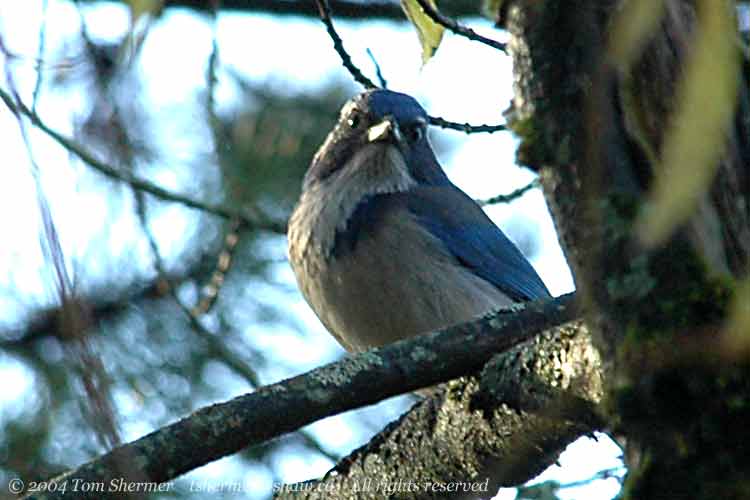 |
| About this
time, poor Bill noticed that the batteries in his camera had died.
He wasn't so happy about that, and rushed back to his car at the
house to get more. The rest of us continued watching the bird. |
|
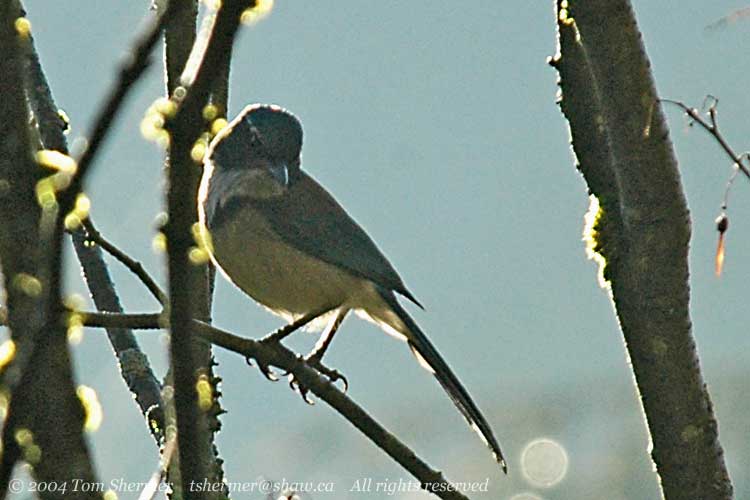 |
| |
|
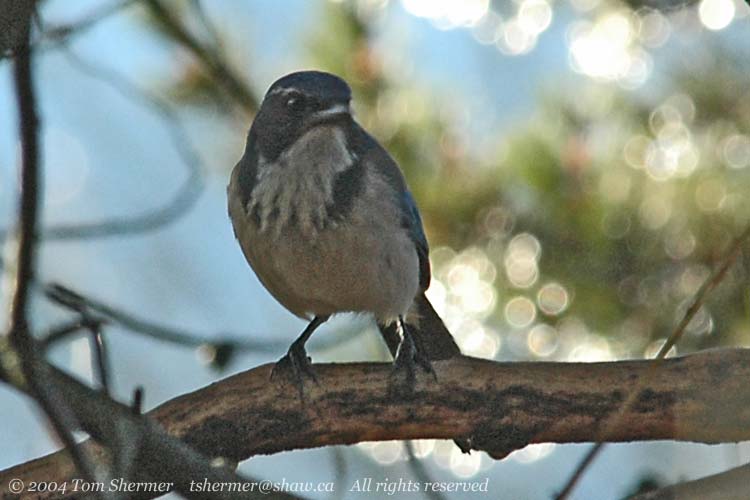 |
|
Eventually, he did
land on the ground and grab a peanut. I didn't get a shot of him
there, though. He was too quick. Once he had his peanut, he headed
for parts unknown. And this is about the time that Bill returned,
too late to get a photo. Poor guy.
From our spot at the
back of the church, there was a nice view down a few backyards
that all had similar fences. On these fences, I caught a few Pine
Siskins.
|
|
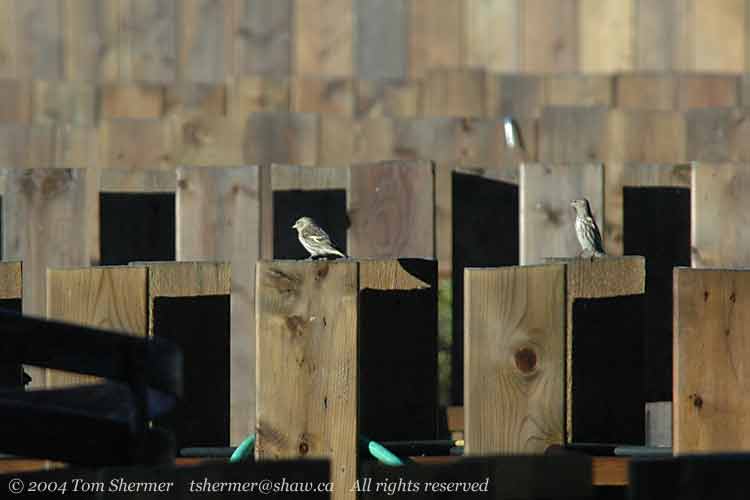 |
| There was
also a Song Sparrow that kept appearing and reappearing on the fences.
Here he is in front of a shed. |
|
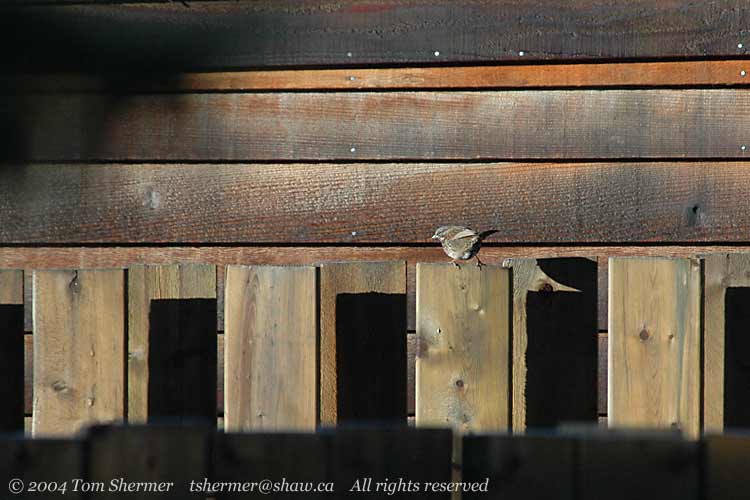 |
|
Ilya saw a Mourning
Dove fly past, but unfortunately we couldn't find where it went.
We returned to the house, ready for the next phase of our expedition...a
trip up to a salmon spawning channel to search for American Dippers.
We took a short drive
on a long road and got out at a park next to a golf course. We
proceeded along a trail, stopping at the top of a small embankment
above the Mamquam River. Here Marcia pointed out our first dipper
of the day. Just as I located him, he went to the middle of a
small channel, did the dipper swimming-with-the-wings thing for
a moment, and then flew a short ways back upstream to where he
was behind some bushes and I couldn't get a good photo. We decided
to head on, reassured by Marcia that we would get better views
of more dippers as we proceeded.
Soon we descended into
a depression leading to a spawning channel. For once, I was happy
to be congested, as dead chum salmon were everywhere. Quite soon,
we came upon a dipper upon a log. I poked around a bit to get
a couple of different angles on him, and eventually got one where
he stood out well from the background.
|
|
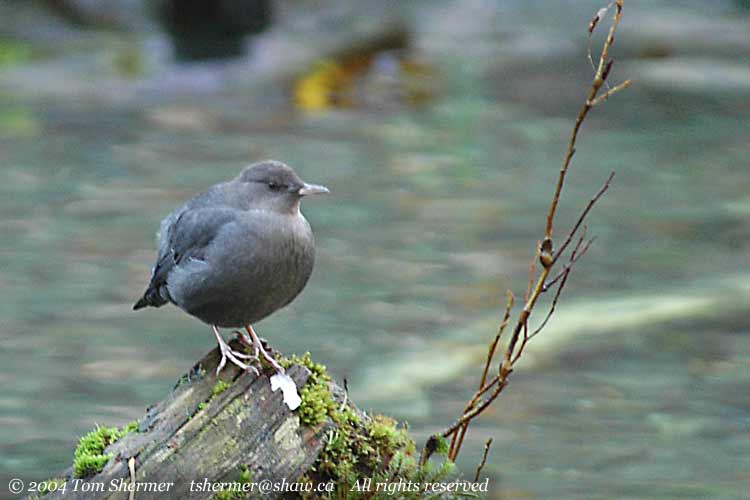 |
|
Dippers have striking
white eyelids and I waited to get a photo of him with his eyelid
down.
|
|
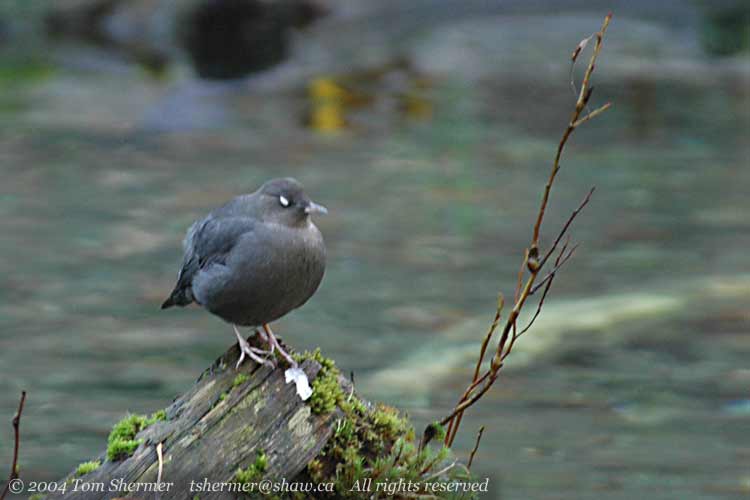 |
|
Well, I was pretty
darned excited by this point. We had gotten both of my main target
birds, a good session with Steller's Jays, and a nice photogenic
row of fences already. We continued our little trek along the
path, with Ilya occasionally whistling to see if maybe the Pygmy-Owl
would reply.
We continued along
the path, and I stopped to take photos of some of the salmon,
both live and dead. Since the dead salmon photos may not appeal
to everyone, I've put them at the end of this photojournal entry
with a little notice before them. There were two types of live
salmon in the channels: Chum and Coho. The Chum were quite sluggish,
at the end of their days. The Coho were still strong and active.
The Chum were grey and the Coho red. Here's one of the live Chum.
|
|
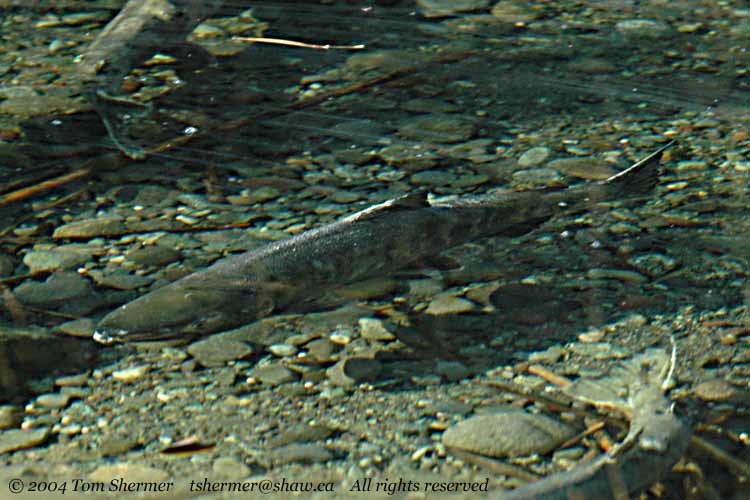 |
|
I hadn't expected to
be shooting water or underwater subjects and so I hadn't brought
my polarizer. A polarizer (essentially, sunglasses for your camera)
will often remove reflections from water's surface, giving a clear
shot of what's beneath. It would have certainly improved the Chum
above. But it would have really made the difference in my Coho
photos. As it was, my Coho turned out pretty poorly, as you can
see in the following.
|
|
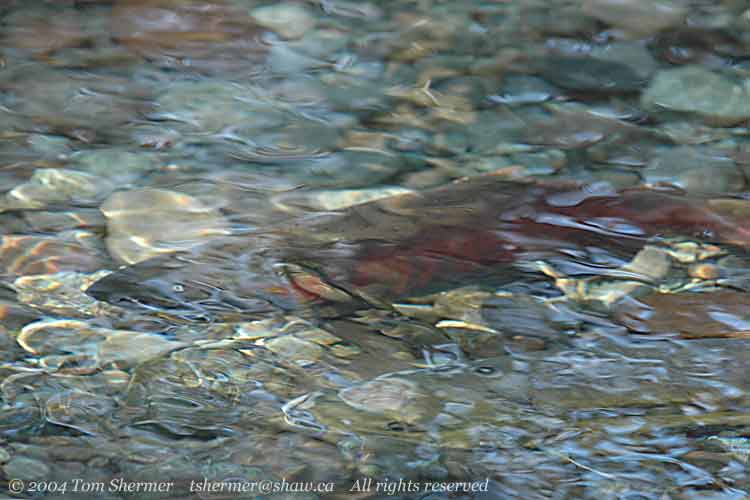 |
|
But I didn't have time
to mourn my photographic woes. Our party continued along the path
we were on. We came to a dead-end and saw a coyote disappear into
the brush on the opposite side of the channel from us. A little
ways further, we crossed a small bridge, and Grant pointed out
a Mallard who was chowing down on one of the dead chum. It's the
front female in this photo; that silver thing she's sticking her
bill in is the fish carcass.
|
|
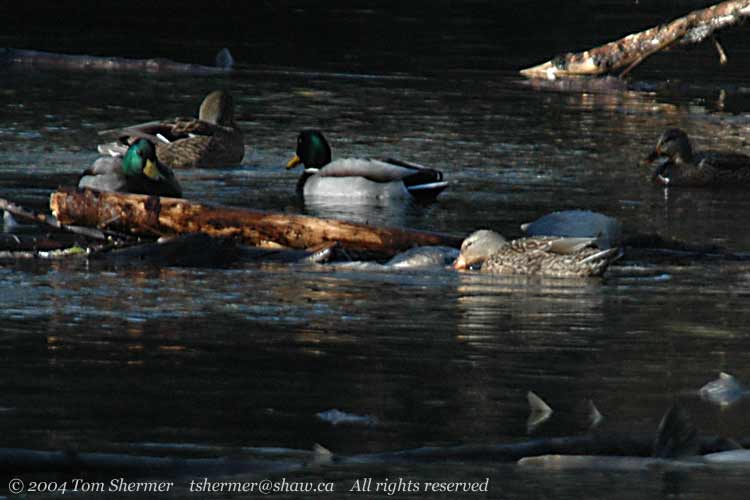 |
| At this
point, we were standing on a small bridge across the channel, and
I spotted a couple of coyotes on the opposite shore. Their camoflauge
was incredible, and they were hard to pick out from the trees and
underbrush. To show you what I mean, the following photo has a coyote
dead center, partly behind some trees. |
|
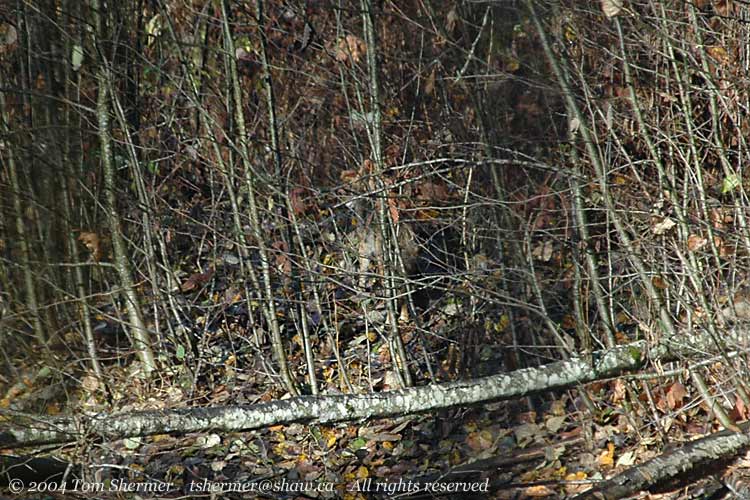 |
|
Just a bit further,
we came upon a light-morph Red-tailed Hawk perched in a tree above
the path.
|
|
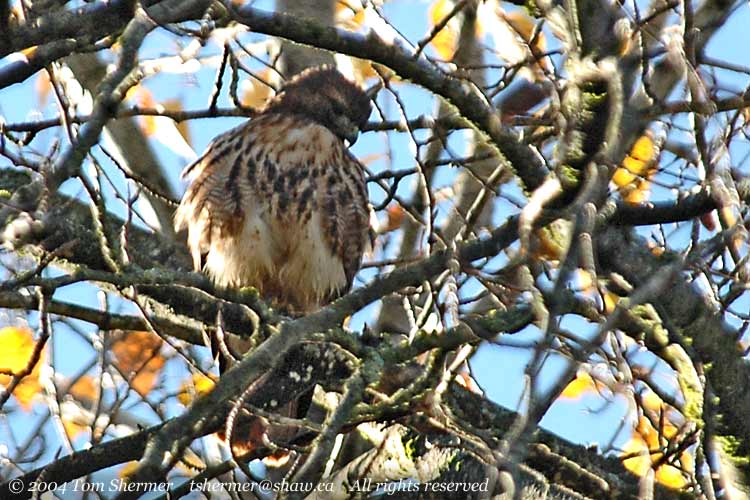 |
|
We were approaching
the riverbed. Almost there, we heard a woodpecker, and Marcia
saw a thrush--possibly a Hermit Thrush. But the thrush flushed,
and we weren't able to find it again. We followed the edge of
the riverbed and did eventually find a woodpecker, though. It
was a Hairy Woodpecker. I didn't get a close shot of her.
|
|
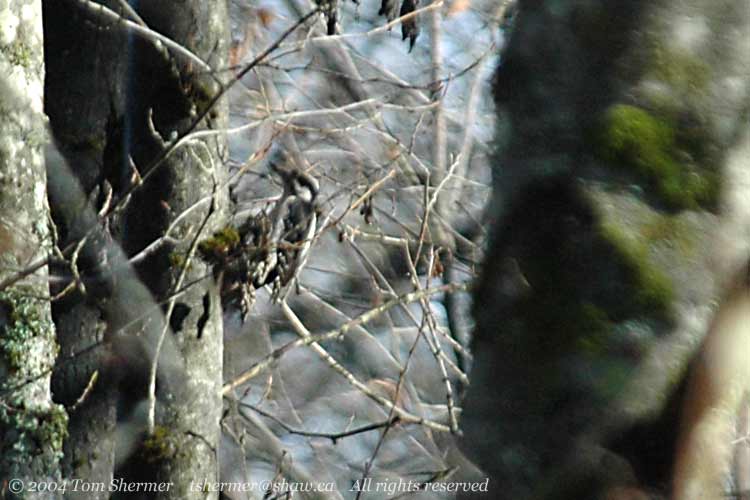 |
|
There was a large flock
of Pine Siskins up above us, and we dutifully scanned for redpolls,
but found none. Just siskins.
|
|
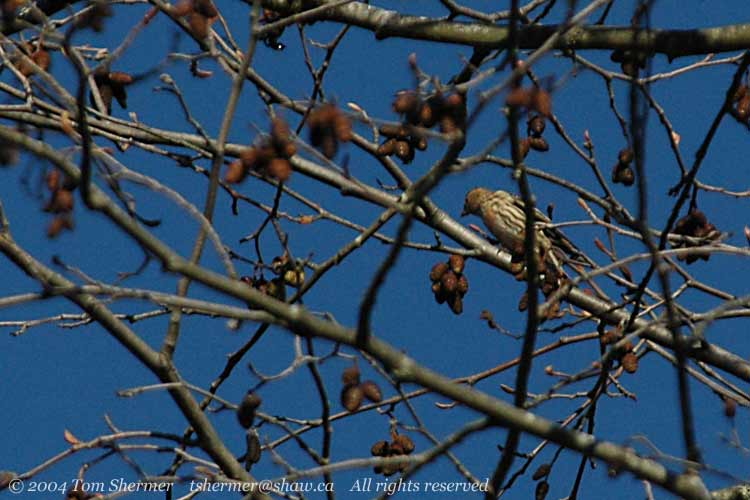 |
|
Eventually we directed
our attention back to the trail, and before long came upon a male
Downy Woodpecker.
|
|
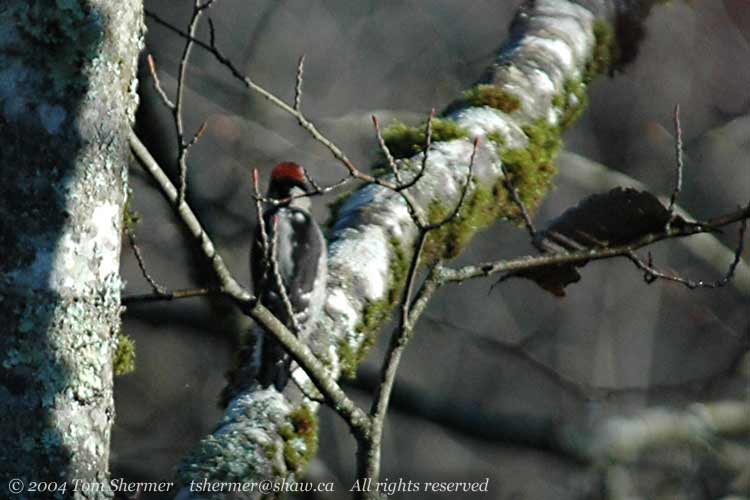 |
|
Our expedition was
moving on in search of Pygmy-Owls, a goal which I heartily endorsed,
so I didn't spend much time trying to get good photos of the woodpeckers.
Next, we came upon
another dipper, in a shaded channel below us. Here I managed to
get a good profile of the whole bird. It was unmistakably dipper-shaped.
|
|
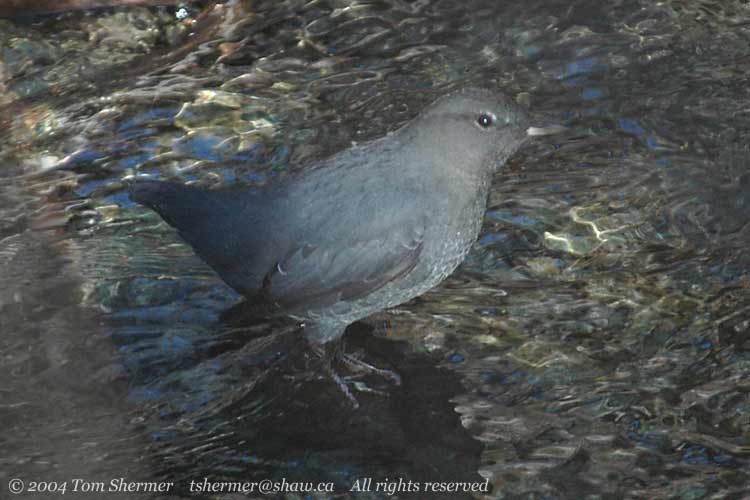 |
| We reached
the turning-back part of our journey with no pygmy-owl. We were
now up out of the channels, beside the golf course. A few Varied
Thrushes were foraging along the trail and in the grass. I took
some blurry shots of them, but ended up liking the effect on some
of the photos. |
|
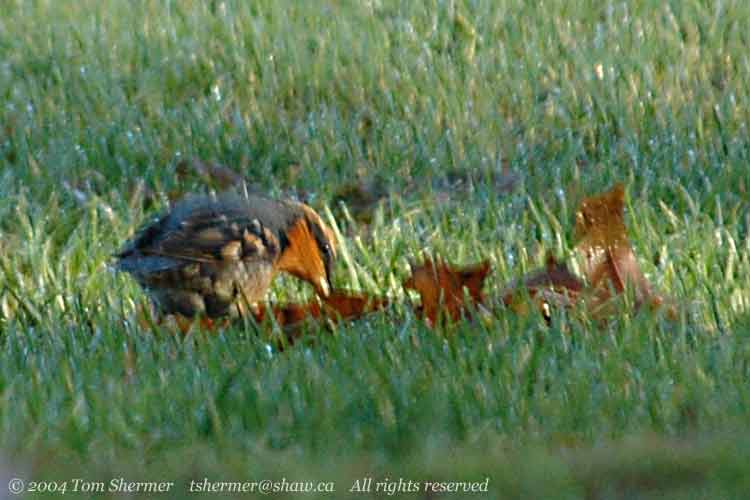 |
|
As we headed back,
we split into two groups, one staying high at the side of the
golf course and the other going low into the woods by the spawning
channels. We thought we'd have a better chance of finding the
pygmy-owl that way. However, we were all coming to grips with
disappointment in the owl department.
But hey, Marcia was
having a very hot day. She heard or saw something, and thought
she caught a glimpse of the little guy. I thought I did, too,
for a few seconds, but I dropped my binoculars to call Bill over,
and then when I rescanned the trees all I found were leaves. Well,
even a fleeting glimpse was big news and we called to the other
group and they tore themselves away from an oddly-behaving woodpecker
to come and look for the owl with us. We scanned for quite a while,
and got discouraged again. Just as we were packing it in, though,
the little bugger called out to us again. To me, unmistakably
an owl. To my troupe, unmistakably a Northern Pygmy-Owl.
We headed off in the
direction the call came from, and eventually Grant located him
in the top of a nearby tree. Unfortunately, he stayed up there,
and it was quite a tall tree, so I didn't get any really good
photos. But that's okay, because he was quite a neat little guy
to see. Here's the best shot I got of him.
|
|
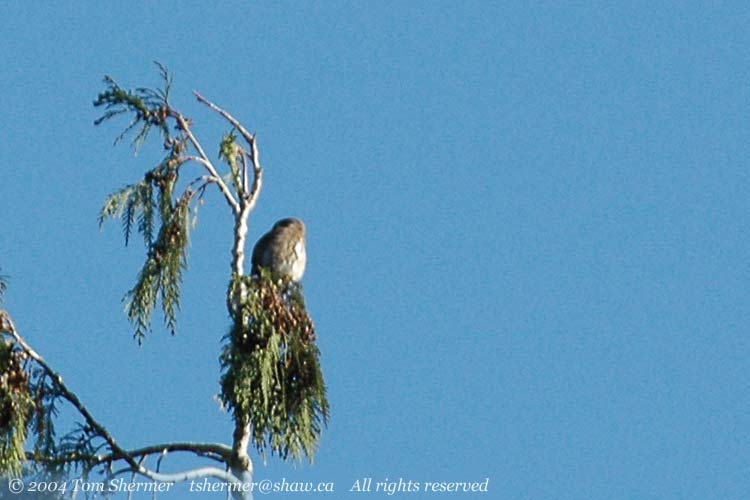 |
|
We were all pretty
excited the rest of the way back to the car; we were having a
great day. The plan next called for lunch at the local Subway,
and then onward to look for the improbable Ruffed Grouse.
Well, lunch involved
more adventure than anticipated, as keys got locked in a car trunk.
But even this ended in a fascinating way...an amazing technological
solution was devised by the tow-truck operator who responded to
our call. He devised a makeshift electric cattle prod and inserted
it into the car trunk at just the right place to jolt the electric
trunk-lock opener and pop open the trunk. I think the guy's name
must have been MacGyver. If my camera hadn't been in the locked
trunk, maybe I would have gotten photos of the whole deal. (Then
again, maybe I wouldn't have...I was inside warming myself when
the deed was done--my coat was in the trunk, too.)
Well, that adventure
only added ten minutes or so to our lunch stop, so it really didn't
detract from our birding time at all. We piled into our two vehicles
and headed to our next stop, a gravel road called Finch Drive,
where grouse had been recently spotted. We parked just before
the road started, and started walking down the road. Maybe one
or two minutes in, spitting distance from where we parked, out
pops a male Ruffed Grouse right in front of us, with ruff extended.
Wow!
Sadly, at this point
I have to report that I had my lens cap on. I wasn't ready. I
pointed the camera at the grouse and all I saw was black. It took
me a few seconds to realize what the problem was; I almost never
put my lens cap on. (I have literally gone for three or four weeks
without even knowing where my lens cap is...I rely on the long
lens hood to keep things from scratching the filter I have on
the lens.) Well, by the time I get the lens cap off and atttempt
focus in the relative dark of the road, the grouse was gone. A
good opportunity missed, and a good reminder of why one must always
keep the camera ready.
I didn't kick myself
too hard, though, as there was a female Ruffed Grouse in the trees
where the male had come from, and I was too busy taking photos
of it to regret missing the male. It was pretty dark and I didn't
expect my photos to come out well, but I did get some recognizable
photos of her. By spending some time in Photoshop to carefully
mask the bird, I could darken the background and make her pop
out a bit more. Maybe I'll do that sometime later when I have
more time...if such a sometime exists. Anyway, this version does
highlight how good her camouflage is.
|
|
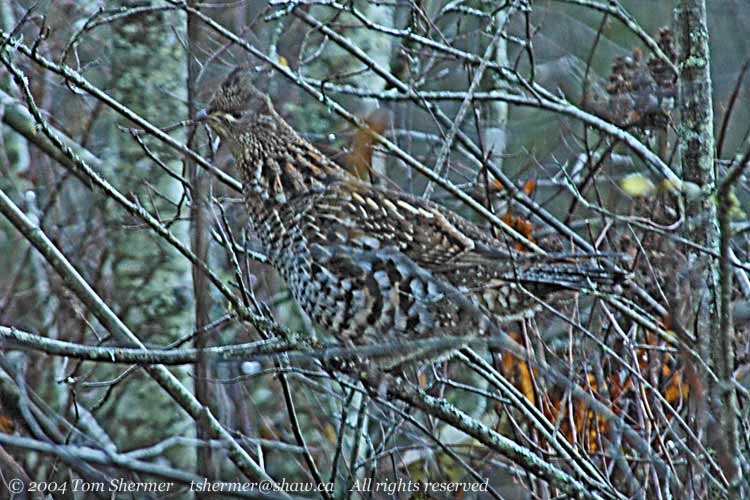 |
|
Well, soon she flew
away, too, and we headed up the road a little bit to try to relocate
them, but we weren't able to. Ah, who cares, we had an amazing
close encounter and the male had put on a real show. What an amazing
day we were having!
Our next stop was the
estuary. There we found a female Common Goldeneye, my fifth lifer
of the day. (Western Scrub-Jay, American Dipper, Northern Pygmy-Owl,
Ruffed Grouse, Common Goldeneye). Here she is.
|
|
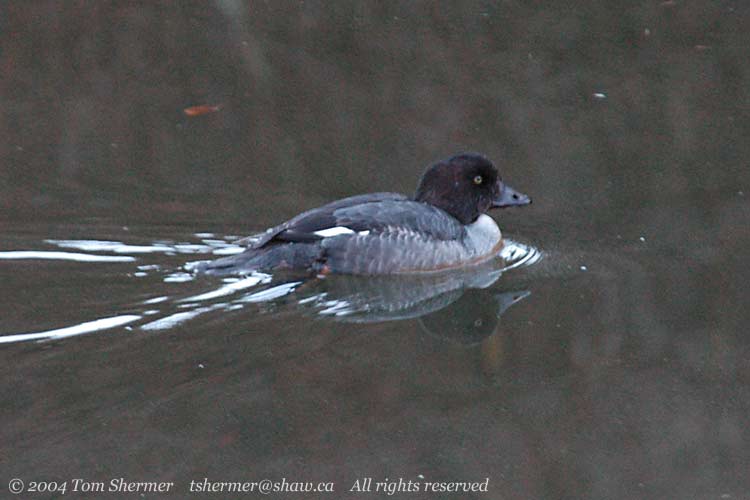 |
|
Proceeding along a
railroad track, we had some marvelous views of The Chief, the
Mamquam Glacier, Shannon Falls, and assorted other landscape items.
Here are two shots of The Chief.
|
|
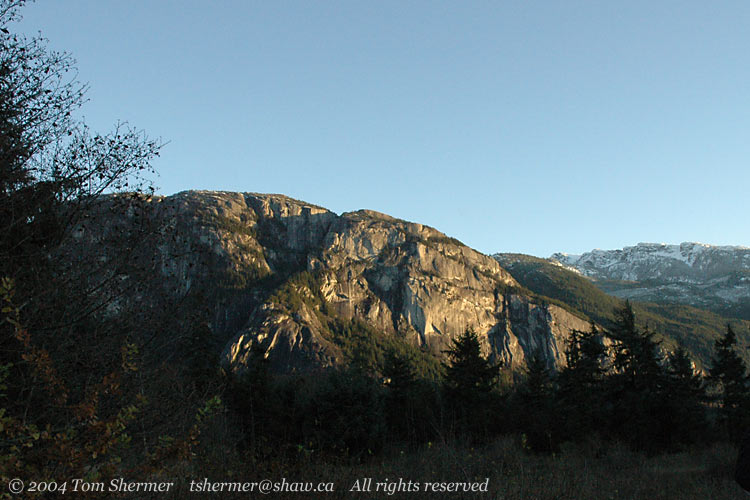 |
| |
|
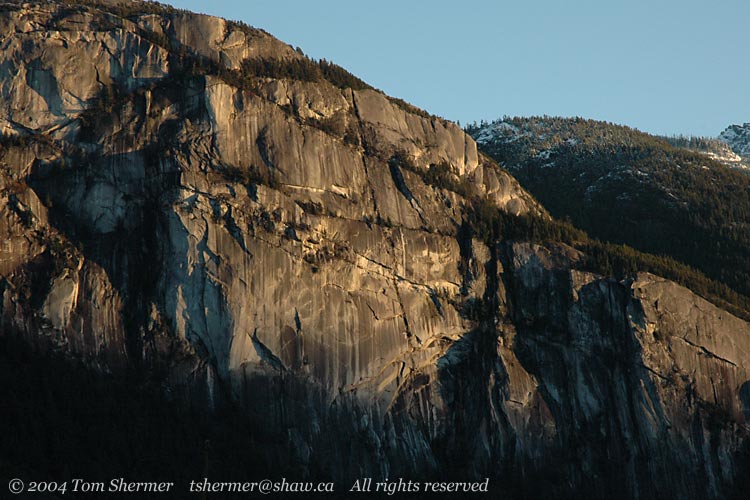 |
|
And here's a shot I
took looking westward over some water in or near the estuary.
I like how the sky and its reflections went totally white in this
shot.
|
|
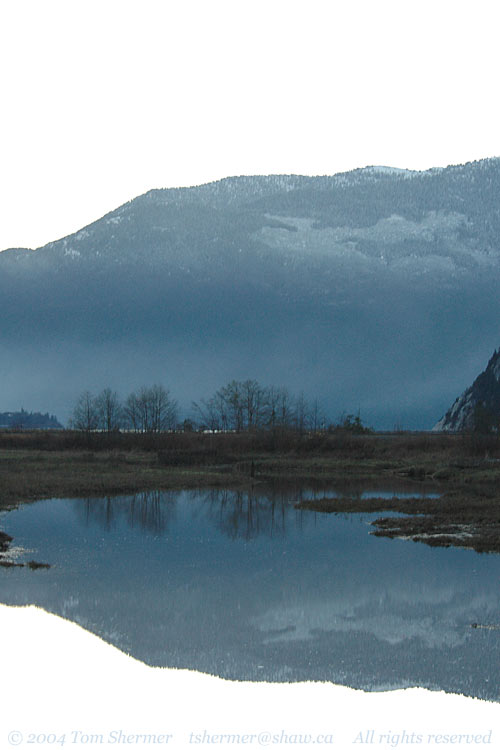 |
|
Our last little birding
thrill of the day was watching a shrike trying to take out a siskin
who was flying in a flock of about eighty or a hundred siskins.
At this point, I had a short lens on my camera for shooting the
landscape.
Back at Grant and Marcia's,
we said our goodbyes and heartfelt thank-yous, and then we had
lovely sunset colors over the mountainous isles and coast to entertain
us on the drive home. It was a fabulous day with great company.
Not what you'd expect,
Tom
|
|
|
|
Below you will find
the dead fish gallery. Don't continue if dead animals creep you
out.
The basic story is
that salmon go up a river to small channels to spawn. When they're
done spawning, they're done with their life, and they end up dying
in these small channels. With their death comes decay, decomposition,
and scavengers. It's a fascinating little corner of natural history.
Anyhow, I'll present
the dead fish (chum salmon) without words. I've already included
enough words in this entry.
|
|
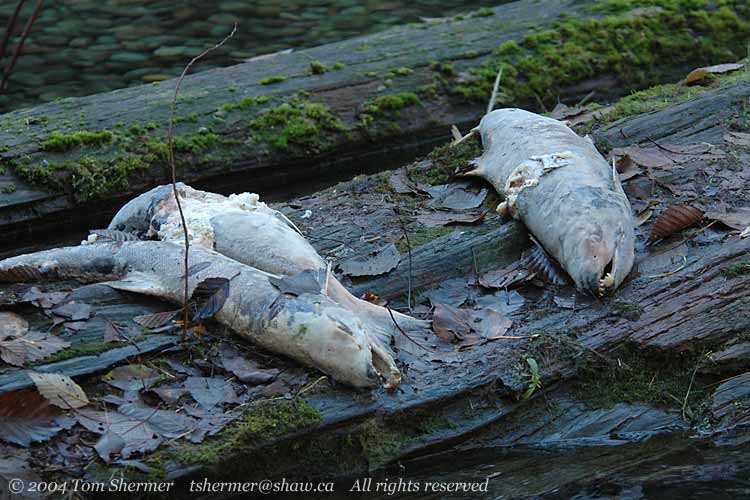 |
| |
|
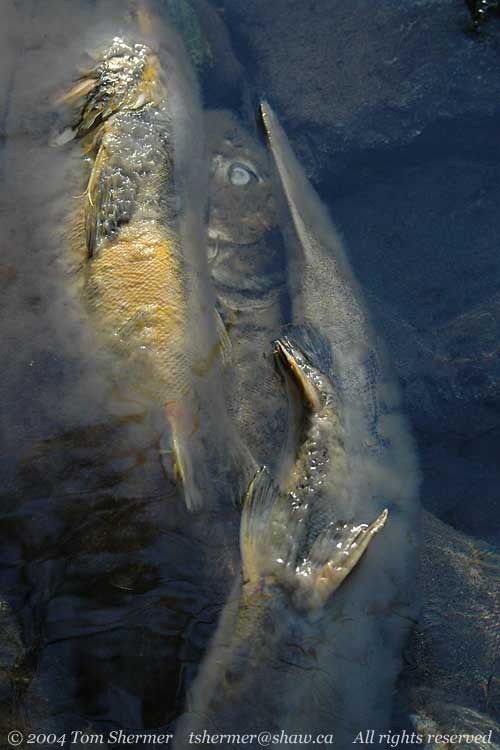 |
| |
|
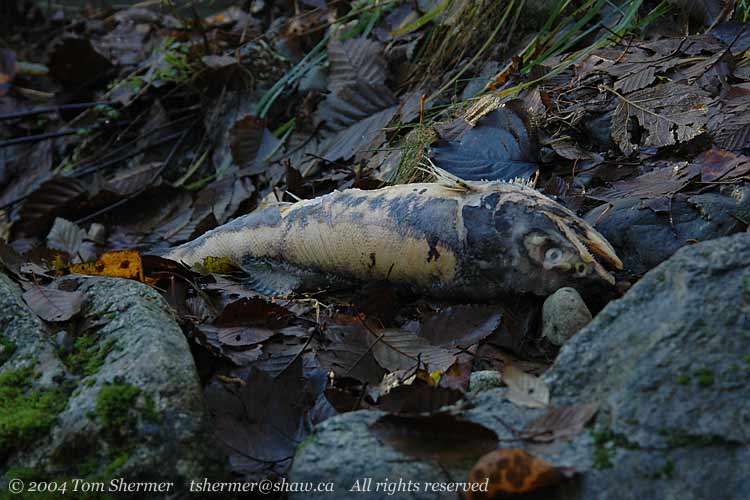 |
| |
|
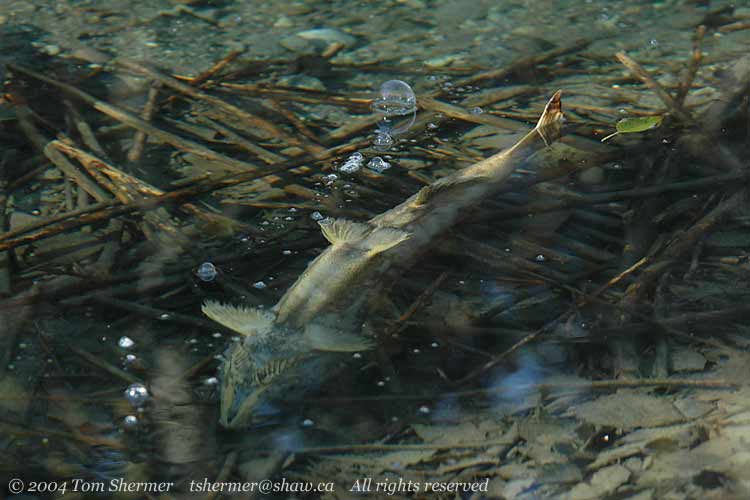 |
| |
|
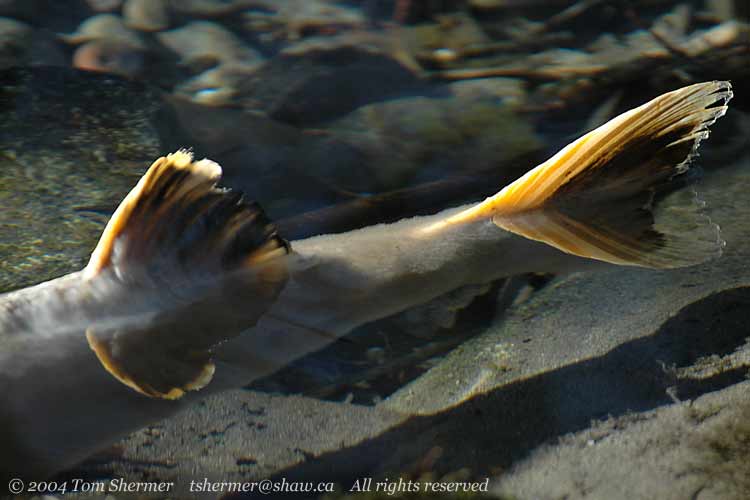 |
| |
|
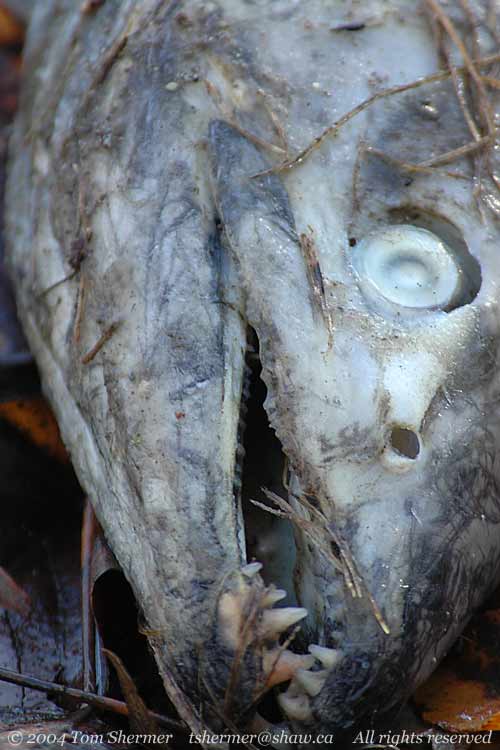 |
| |
|
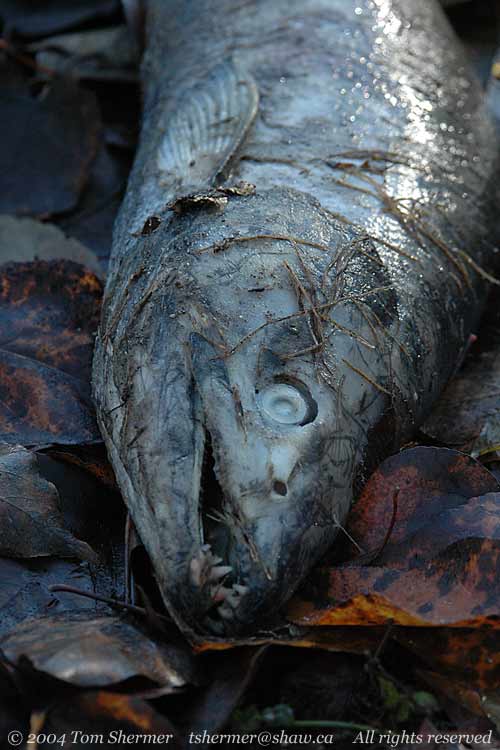 |
| |
|
|